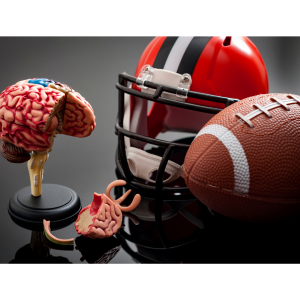What Are the Long-Term Effects of a Brain Injury?
How Serious is a Brain Injury?
One of the most serious potential repercussions from a car accident or other traumatic incident is a brain injury. Anytime a person’s head suffers a sharp blow or a violent jolt to the head, they run the risk of developing a traumatic brain injury (TBI).
Since these injuries are internal, they are not as obvious or as easy to diagnose as an injury to the body, such as a laceration or broken bone. However, brain injuries can cause lasting damage that can take months or even years to heal–or cause permanent impairment that affects a person’s cognition, emotions, and behavior for their entire lives.
It is important to understand the long-term symptoms and effects of traumatic brain injuries, so that those who suffer from them can get proper treatment, as well as fair compensation from the party responsible for the accident. If you were involved in an accident that caused a TBI, contact an experienced brain injury attorney from Munley Law Personal Injury Attorneys to help you with your claim.
What Are the Causes of a Traumatic Brain Injury?

These traumatic brain injuries occur from a variety of causes, including sports injuries and attempted suicide or homicide with a firearm. Other common causes are unintentional slip and fall accidents resulting in head injury, and motor vehicle accidents that cause a head injury to a driver or a passenger. In 2020, about 176 Americans died from TBI-related injuries each day, or more than 64,000 in total. Slip and falls accounted for about 30 percent of deaths from traumatic brain injury, according to CDC data; motor vehicle accidents accounted for about 17 percent of brain-injury deaths.
What Are the Types of Traumatic Brain Injury?
Damage to brain tissue can range from a bump causing temporary swelling, to more severe traumatic brain injuries resulting in long-lasting bruising, tears, bleeding, and other damage. According to Healthline, some types of traumatic brain injuries include:
- Concussion: A generally mild type of traumatic brain injury, concussion can be caused by either a blow to the head, or a whiplash-type head injury that causes the head to swing wildly back and forth. Thought to be caused by the impact of the brain hitting the inside wall of the skull, it can lead to bruising or swelling of the brain tissue that usually resolves over time.
- Edema: A more serious swelling that occurs in the brain, an edema can be particularly damaging to tissue since the skull cannot expand to accommodate the increase, leading to dangerous buildup of pressure that can damage the exterior of the brain.
- Hemorrhage: Uncontrolled bleeding within the skull, a hemorrhage can either cause bleeding around the outside of the brain (subarachnoid hemorrhage) or within the spaces inside the brain itself (intracerebral hemorrhage). The effects of this brain injury can vary widely, depending on how much bleeding there is and how much pressure builds up within the brain.
- Hematoma: A clotting of blood inside the brain, a hematoma can be a serious brain injury that can lead to pressure buildup, causing loss of consciousness and potentially permanent brain damage.
- Skull fracture: Caused by an object cracking the skull, a skull fracture is a serious head injury that can lead to damage from exposure of the brain or penetration by a bone fragment or foreign object. This can lead to infection, swelling, or bleeding.
- Diffuse axonal injury: One of the most serious types of brain injuries, a diffuse axonal injury (DAI) occurs from the tearing of nerve fibers (axons) as the brain shifts or rotates within the skull in response to trauma. A DAI can be one of the most difficult types of brain injuries to diagnose, since the changes are microscopic and might not even show up on a magnetic resonance imaging (MRI) scan. However, a DAI can lead to serious long-term complications, including coma and death.
What Are the Symptoms of a Mild Traumatic Brain Injury?

In addition, a mild brain injury may impact mood and emotions, making a person feel anxious, sad, or irritable; as well as cognition, making it difficult to pay attention or remember things. These emotional issues may be exacerbated by post-traumatic stress disorder from the accident itself. A mild brain injury may also affect sleep, resulting in too much or too little sleep, or difficulty falling asleep.
Usually this type of brain injury is short-term in nature, and resolves over the course of a few days with rest. However, sometimes they result in more serious problems, including repeated vomiting, seizures, slurred speech, or trouble waking from sleep. In these cases, it is essential that the person experiencing the brain injury seek urgent medical attention.
What Are the Symptoms of Moderate to Severe TBI?
A moderate to severe TBI can lead to much more serious symptoms with a longer-term effect. According to the Mayo Clinic, physical symptoms from this type of traumatic brain injury may include:
- loss of consciousness of up to several hours
- a persistent headache
- persistent nausea with repeated vomiting
- seizures or convulsions
- clear fluid draining from the nose or ears
- an inability to waken from sleep
- weakness or numbness in the extremities
In addition, a moderate to severe traumatic brain injury may cause serious mental and cognitive symptoms as well, such as:
- profound confusion
- extreme agitation or combative behavior
- slurred speech
- coma
These injuries require immediate medical attention and treatment in order to avoid even further complications. Even with medical treatment, a traumatic brain injury may lead to long-term symptoms that can affect a person for months or years, if not the rest of their life.
What Are the Long-Term Effects of a Severe Traumatic Brain Injury?
A severe TBI may lead to many different types of long-lasting mental deficits and disabilities that can affect major life functions. Among the many types of physical and mental TBI symptoms that can persist, according to Brainline, are:
- Paralysis
- Muscle stiffness and uncontrolled movements
- Problems walking and talking
- Vision problems
- Loss of fine motor skills, such as tying shoelaces
- Difficulty thinking or remembering things
- Loss of control over bladder and bowel functions
- Appetite changes
- Sleep disorders
- Difficulty regulating body temperature
Severe injuries can also impact speech and language and sensory processing within the brain, including:
- Aphasia, that is, difficulty reading or expressing ideas or “getting the words out” even when a person knows what they want to say
- Slurred speech or speaking too fast or two slow
- Difficulty distinguishing touch and pressure sensations
- Loss of vision or blurred vision
- Decrease in hearing or tinnitus (ringing in the ears)
- Loss of taste or a bad taste in the mouth
Severe injuries can also cause challenges to social and emotional well-being, including:
- Difficulty making and keeping relationships
- Difficulty taking part in social activities
- Difficulty taking part in recreation and sports
- An inability to work or stay focused in school
Oftentimes in severe traumatic brain injuries, many of these symptoms occur together, (exacerbated by the post-traumatic stress disorder from the accident itself) creating significant challenges that require a range of treatments to manage.
How is a Traumatic Brain Injury Treated?

For more severe types of TBI, a patient might need an immediate intervention in the hospital. A traumatic brain injury that involves blood clots or pools will require a surgeon to remove these areas before they put too much pressure on the brain and damage tissues.
A surgeon may also be required to treat a brain injury caused by a skull fracture, in which parts of the skull or other objects may be present within the skull and could damage or infect tissue. In these kinds of head injuries, the doctor must remove these objects before they cause lasting damage. In head injuries where the skull is intact, on the other hand, a surgeon may need to actually relieve pressure by making a hole in the skull and inserting a drain that allows fluid to escape and relieve pressure.
Following an immediate emergency procedure, doctors may prescribe a range of medicines to help alleviate the symptoms associated with the brain injury. Depending on the symptoms that are present, a doctor may prescribe:
- anti-anxiety medication
- anticoagulants to prevent blood clots
- anticonvulsants to prevent seizures
- diuretics to remove excess fluid
- muscle relaxants to reduce spasms
- stimulants to aid in paying attention
In addition, long-term rehabilitation may be necessary to overcome or mitigate the lasting effects of a brain injury. Rehab may address the physical, cognitive, and emotional impacts of brain injury, helping a patient resume to more normal life in which they are able to better manage daily tasks and social interactions.
A brain injury patient may engage in
- physical therapy to build strength and balance
- occupational therapy to help perform daily tasks
- vocational counseling to help return to duties at work
- cognitive therapy to improve memory and perception
- speech therapy to improve ability to talk and overcome aphasia
- psychological counseling to learn coping skills and overcome emotional issues caused by both the brain injury and post traumatic stress disorder from the accident
With a combination of all of these treatments, many brain injury patients can return to normal life or even make a full recovery from their accidents. Some brain injury patients, however, are never able to fully recover from their deficits, and must learn to manage the disabilities brought on by their head injury for the rest of their lives.
How Can I Receive Compensation for the Effects of a Traumatic Brain Injury?

Oftentimes an insurance company will offer a lowball amount of money to compensate the victim of a car accident or slip-and-fall accident, that may or may not cover immediate medical bills. However, a brain injury often requires specialized and/or long-term treatment that can significantly increase the amount of compensation required to make the accident victim whole.
Even a victim of a mild brain injury, such a a concussion, may be entitled to receive in excess of $100,000 for medical bills, lost wages, and other expenses associated with the brain injury.
When a brain injury is more severe, it may require long-term treatment and rehabilitation, sometimes lasting a person’s entire life. For these brain-injury patients, it is not uncommon to receive in excess of $1 million, or even more than $10 million.
It is essential that a person who suffers a brain injury–or may suspect they suffered a brain injury–contact an an experienced personal injury attorney, who can help them assess the extent of the brain injury and negotiate with an insurance company or bring the responsible party to court to get the brain-injury victim the fair compensation they deserve.
Contact Munley Law Personal Injury Attorneys for a Free Consultation

Our personal injury lawyers have consistently been named among the Best Lawyers in America, selected to Pennsylvania Super Lawyers, and are board certified by the National Board of Trial Advocacy. And, we get results – our lawyers have achieved numerous multi-million dollar settlements and verdicts.
The personal injury lawyers at Munley Law Personal Injury Attorneys care very deeply about our clients. Our compassionate attorneys and our entire staff will do everything in our power to help you during this time of need. You can count on our team—we have decades of success and satisfied clients, and we will devote all of the time and resources necessary for you to win your case.
We know you may have questions about brain injury but may be nervous to contact a lawyer. That’s why our law firm offers FREE, no-obligation case evaluations to all accident victims. You can reach someone from our staff 24 hours a day, 7 days a week. No matter how complicated or difficult your case may be, we will review the facts and explain what legal options are available to you. Chat live, email us, or call today.

Marion Munley
Marion Munley has been practicing personal injury law for nearly 40 years. She is triple board-certified by the National Board of Trial Advocacy for Truck Accident Law, Civil Trial Law, and Civil Practice Advocacy. She currently serves as Vice President of the American Association for Justice, an organization dedicated to safeguarding victims’ rights. Marion has won many multimillion-dollar recoveries for her clients, including one of the largest trucking accident settlements in history. She has been named a Top 10 Super Lawyer in Pennsylvania since 2023, a Best Lawyer in America, and was recently inducted to the Lawdragon Hall of Fame.
Posted in Personal Injury.
Tagged Claim Concussion Insurance Loss Post-Traumatic Stress Disorder Slip and Fall









